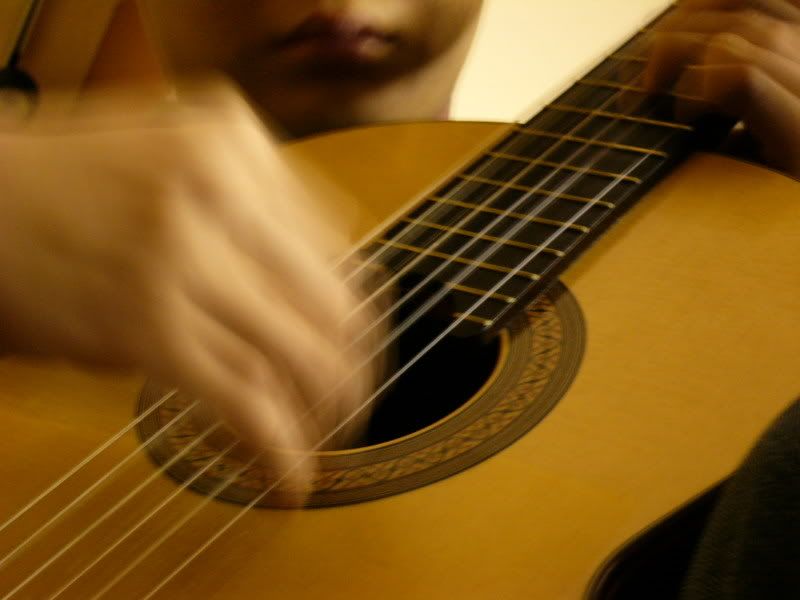I'm listening to a fantastic recording by Xuefei Yang, a great guitarist whom I first met and listened to some 4 years ago in Singapore. She's based in London, so while I was there I had a couple more opportunities to see her play, and she also by chance happened to be an old housemate of my pianist friend Bobby Chen.
She's got a reputation as one of the best classical guitarists in the world today, and listening to her now I am reminded of what it means to be a true musician.
Tuesday, December 12, 2006
Sunday, December 10, 2006
Many scientists and mathematicians are also musicians. Einstein himself was a violinist of no small talent. An anecdote has it that a music critic, unaware that Einstein's fame comes from being a physicist, wrote after hearing Einstein play: "While his playing is excellent, but he does not deserve world fame; there are many others who play just as well". When I was an undergraduate in UCL, I took part in the informal chamber music club run by faculty and students; I was constantly surprised how many of the performers were from the physics department, or were otherwise scientists. So much for the cold and prosaic nature of scientists.
Before I entered university, I had an argument with my parents because I wanted to go into music. In retrospect, it wasn't a good idea because my playing level then was nowhere as good as I imagined it (a little exposure can sometimes go a long way towards deflating one's ego), but my love for music didn't fade even though my parents squashed the idea of paying for me to study music. In the first two years of university, I was practising my guitar so much that I did little else apart from physics. My nights were spent in a caress with my guitar, as I pushed my uncooperative fingers to make music. My memory holds many different emotions from those days: frustration from being unable to create beauty, pain from making my fingers do things they weren't born to do, ecstasy from those few moments when everything came together and I was the alpha and omega of my personal world of music.
I was aware of the sacrifices I was making, and there were times when I questioned if it was worthwhile. Yet, despite the social exclusion and frustrations of making music, I kept going back to my guitar. Paradoxically, the more I played the more I discovered my limitations; at the same time, I was discovering my potential in physics and astronomy. I knew that my career ahead probably lies in science. My love of music did not diminish, but instead of playing myself I started to listen to more music, which was something I could do at the same time as my academic work. I never really stopped playing, but there were weeks at a time when I didn't touch my guitar, and my old repertoire started falling away faster than I could learn new music. This forced me to change my focus towards perfecting a few pieces, rather than try to memorise large amounts of music. This allowed me to continue growing as a musician, as I started to listen more to my own playing, and to control the music with my will instead of letting my limited technique dictate the direction of the music.
*To be continued*
Before I entered university, I had an argument with my parents because I wanted to go into music. In retrospect, it wasn't a good idea because my playing level then was nowhere as good as I imagined it (a little exposure can sometimes go a long way towards deflating one's ego), but my love for music didn't fade even though my parents squashed the idea of paying for me to study music. In the first two years of university, I was practising my guitar so much that I did little else apart from physics. My nights were spent in a caress with my guitar, as I pushed my uncooperative fingers to make music. My memory holds many different emotions from those days: frustration from being unable to create beauty, pain from making my fingers do things they weren't born to do, ecstasy from those few moments when everything came together and I was the alpha and omega of my personal world of music.
I was aware of the sacrifices I was making, and there were times when I questioned if it was worthwhile. Yet, despite the social exclusion and frustrations of making music, I kept going back to my guitar. Paradoxically, the more I played the more I discovered my limitations; at the same time, I was discovering my potential in physics and astronomy. I knew that my career ahead probably lies in science. My love of music did not diminish, but instead of playing myself I started to listen to more music, which was something I could do at the same time as my academic work. I never really stopped playing, but there were weeks at a time when I didn't touch my guitar, and my old repertoire started falling away faster than I could learn new music. This forced me to change my focus towards perfecting a few pieces, rather than try to memorise large amounts of music. This allowed me to continue growing as a musician, as I started to listen more to my own playing, and to control the music with my will instead of letting my limited technique dictate the direction of the music.
*To be continued*
Subscribe to:
Comments (Atom)
